#I believe in a free and independent Irish Republic
Text
And just the parallels these people are drawing, trying to insult me, an Irish person, when I’m talking about freeing Palestine. They’re sooo telling.
All these people demanding Palestinian activists tell them whether or not they “condemn Hamas”, which is just such bullshit and a bad faith question. I highly recommend watching the interview the Palestinian ambassador gave on the bbc, just completely obliterating this question. But yes these people will then turn around to me as soon as I speak on Palestine, and ask “do you condemn the IRA!?!?!”.
Once again asked by people without a shred of knowledge on the history of Ireland or Palestine.
First, on the IRA. The IRA (Irish Republican Army) was formed in 1917 from the members of the Irish Volunteers and the Irish Citizen Army. Notice the key words “volunteers” and “citizen”. It was never an army, just a volunteer resistance force of Irish citizens. They didn’t even have weapons at the start. They would train in the woods holding hurls to substitute guns. It wasn’t until the risings when they received weapons donated by other nations supporting the Irish gaining freedom.
More Irish people (who didn’t have the army training the British forces had) were killed and imprisoned by the British, than they killed the British. Various risings and civil wars continued until the Republic came to be in 1948. The six counties of the North are still of course under British rule.
My point is, people (*cough cough* Americans) who “love” Ireland and are so happy that Ireland gained freedom, then turn around and ask us to “condemn the IRA/ Hamas”…
I’m not even going to go into the fact that the IRA has since splintered off into a million different factions and some of them are involved in organised crime, blah, blah. Because again, “condemning the IRA” for gaining freedom for the republic because of the later actions of SOME of them, is just bad faith!
People looovvvee Ireland and Irish culture and are glad the republic exists and are “sad” for the North, but don’t want to acknowledge that we’ve only come this far by violent resistance! If we could’ve just asked real nice for England to fuck off, in the 700 years they occupied us, we would’ve! Peace talks don’t do shit when one side is a colonising power that doesn’t want to leave the other alone!
And again, it’s assuming that colonisation and apartheid states aren’t violent themselves. In both Palestine and Ireland, our oppressors subjugated and forced us into unimaginable conditions for so fucking long. Then when people try to oppose them, they’re called terrorists?
I mean shit, you Americans even have your 4th of July where you celebrate how you guys violently overthrew the English and gained independence. Do we condemn those soldiers for killing British soldiers? I mean every Independence Day of every country involves form of violent rebellion… that’s how shit gets done.
Hamas is a small resistance group. The IDF is a literal army with actual training and the world’s best weapons provided by the biggest powers of the world. EVEN IF somehow Hamas was a big scary terrorist organisation with military grade weapons, what Israel is doing has nothing to do with Hamas. They are bombing fucking children, hospitals, refugee camps, journalists!! All of which are fucking war crimes.
Israel is flooding social media with propaganda about how the hospitals were “Hamas headquarters”. Taking pictures of a board with the days of the week in Arabic and claiming it’s “Hamas terrorist plans”.
This is what the English depicted us as, and it’s what Israel will depict Palestine as. Of course we’re going to support them.
A great quote from on of my favourite films (Pride, 2014) is: “I don’t believe the papers when they talk about us, why should I believe it when they talk about them?”.
150 notes
·
View notes
Text
Okay, okay. Last one for today, I promise! Before I go to bed, have some further thoughts about the British Isles bros in my Hetalia National Animals AU:
England: rabbit → lion
Yep, Arthur was a twitchy-nosed bun when he was young. Something I bet he finds very embarrassing even to this day, hehe. Neither species is native to Britain, interestingly enough. Lions are obvious but people think rabbits have always been here. When in fact they were brought over by the Romans as a food source to support their invasion. The more you know. 💫 I picture Arthur as ever feeling a bit of an outsider in his family (the lone anglo amongst celts) and it fits with this interpretation. His older bros all have either native or domestic creatures for their animal forms. And then there’s Arthur: sticking out like a sore thumb with England’s giant, fuck off, big cat, lol. He became a lion sometime after William the Conqueror took over England. The golden English lion the world is familiar with is actually the emblem of Normandy; the French Duchy William originated from.
Scotland: stag
A heck of a lot of Scottish heraldry uses deer and, since I’m enforcing a self-imposed ban on mythical animals in this AU, a stag makes a good stand-in for the Scottish unicorn. Alasdair was the only brother who scored some real, lasting victories against Arthur back in the day. As evidenced by Scotland keeping its independence and then joining the UK as a kinda, sorta equal partner rather than being dragged in against its will. So Alasdair would need to be a big, powerful beast that could toss a lion on its horns on a good day. So yeah, a stag is good for him.
Wales: ??? → ??? → dog
Wales is the brother giving me the most trouble. For starters, I feel like he should have had a different form back in the old days. Like Arthur’s rabbit, but IDK what it should be? Then I wonder if he should have spent time as a lion alongside Arthur. Wales was conquered to the extent that it was considered fully part of England for hundreds of years. That’s why the Welsh flag doesn’t get its own part of the Union Jack like the other home nations, don’tcha know. Wales as a reddish furred lion alongside Arthur’s gold would be pretty cool, ngl. But then Wales did manage to preserve its national identity in spite of everything. So I’m not sure a full transformation is appropriate in his case. Even if it would get reversed later when Wales regained its status as a country through devolution. The only thing I am sure of is that his true beast form would be a dog. Something clever and tough that can herd and guard with care, but is equally able to rip apart a predator without mercy. Maybe some kind of sighthound like in the legend of Gelert.
Ireland: grey wolf → Irish wolfhound → ???
Speaking of doges with sad backstories! Ireland would have remained a wolf until he was conquered and became a part of the United Kingdom. Even before that happened there was this whole thing about eradicating Ireland’s wolves. Which I believe was spearheaded by the ruling English lords? My history lessons on this were ages ago so feel free to correct me if I’m wrong. There was definitely a drive to tame and “civilise” what the English saw as a savage and wild land, I know that much. So a wolf-to-dog forced transformation is as much appropriate as it would be unwanted by the one enduring it. Definitely a lot of trauma there, methinks. Would Ireland turn back into a wolf after his people left the union and he became a republic? Mmmaybe…? I don’t know. Ireland was forever changed by its inability to resist the British invasion. A lot of its native culture was lost or replaced as a result. And a dog being so close to a wolf anyway could make changing back even harder. Mmm yeah, IDK. Leaving it ambiguous might be appropriate in itself.
Northern Ireland: grey wolf → Irish wolfhound
Eeyup, same beasts for the Ireland twins. Their attitudes towards the changes they’ve gone through would be very different, though. If it’s ambiguous whether or not Ireland is turning back to a true wolf, North definitely isn’t. If Hima had kept the UK bros’ story closer to real history then North would never have been a wolf at all. Starting life as a hound right from the beginning instead. But he didn’t, and so we got the slightly confusing scenario of both twins already existing long before partition put Northern Ireland on track to becoming a distinct nation. Ah well, what ya gonna do. Hima moves in mysterious ways.
#hetalia#hws england#hws scotland#hws wales#hws ireland#hws northern ireland#aph england#aph scotland#aph wales#aph ireland#aph northern ireland#national animals au#my posts
18 notes
·
View notes
Text
.
#I believe in a free and independent Irish Republic#every time I come here I’m reminded how beautiful this land and its people are#and how ugly colonialism is#land back means land back everywhere#solidarity is strength
1 note
·
View note
Text
Stormwatch and Irish history
It’s been a while since the release of Arknights Chapter 9, so I feel it’s a good time to talk about its historical inspiration.
I expect that plenty of people noticed that the Victorians and Tarans are analogues for the British and Irish. I also expect that plenty of people assumed the conflict portrayed is an analogue for The Troubles that dominated Northern Ireland in the latter half of the 20th century.
I do not believe that The Troubles are the basis of Stormwatch’s inspiration; rather, I see more similarities with the conflicts that led to the formation of the Irish Free State that ultimately became the Republic of Ireland. In particular, I think they took inspiration from the Easter Rising.
(For my part, I’m not much of a historian, but to me this is general family and national history. My aim is simply for a rough sketch.)
By 1916 Ireland had been under the control of Britain for several centuries, and a formal part of the country since 1800. The past few decades had seen peaceful and constitutional self-rule movements, but in Easter of 1916 republicans seized control of parts of Dublin and proclaimed independence. The British Army quickly recaptured the city, but their tactics included using artillery against the city and killed many civilians. The brutality of it bolstered support for the independence movement and marked a new phase in its history.
Sound familiar? A “peaceful” status quo shattered first by insurgents capturing a city, then the brutal and indiscriminate backlash from the governing forces. Dublinn never intended to hold County Hillock; their purpose was to declare their existence and purpose, and it looks to be the spark that lights a fire.
Conversely, much of The Troubles seems unfamiliar from the perspective of Stormwatch. You can’t tell the story of Northern Ireland without including the ethnic/sectarian divisions between its Protestant majority and Catholic minority communities, and how they typically relate to the wish to remain in the UK/join independent Ireland respectively. The myriad communal tensions there simply aren’t represented in the Taran civilians, where the most you see is a moderate-extreme scale and how that relates to attitudes towards Dublinn.
(One point that does remind me of The Troubles is the unconditional support Dublinn demands from Tarans: we proclaim we fight for you, therefore if you act against us you are a traitor. Multiple are the stories I’ve heard about how Catholics were expected to give harbour to the IRA regardless of their personal feelings, and of the IRA enacting its own justice within communities.)
I could go on, as The Troubles are a messy affair tangled up in the complex web of history. But then, what isn’t? While Arknights is taking inspiration from history, I don’t think they’re aiming to retell history. By telling their own story and keeping the informing history at arm’s length, they can try to avoid getting bogged down in the risk of appearing to pick sides or determining which details are unimportant enough to leave out, let alone claiming how your OCs might have made things better.
Stormwatch isn’t “The Troubles with catgirls”, but it isn’t really “The Easter Rising with catgirls” either. It’s a story about a brittle imperial status quo and how divisions can fester and harden. It’s a story about model minorities. It’s a story about how someone can justify committing genocide as a righteous and necessary act. It also looks to be a story of conspiracies within conspiracies, as we might expect from Arknights by now. I don’t think any version of the IRA was quite so quick to murder people in the name of secrecy, nor was the state implicitly letting them run free. I don’t think they were vying for the throne. I’m no expert, but I don’t think Theresis was there either.
There are other interesting conversations to have, like how the AK story most focused on racism so far has been about racism between two groups of identical-looking Felines, but I think that’s enough for one post.
#Arknights#AK aside#I've seen too many gross simplifications of NI history on this website#I don't think I've conveyed much of the complexities#but I hope I've at least conveyed that it's complex#and that you won't get an informed opinion on it from a couple of text posts
276 notes
·
View notes
Text
Events 11.21
164 BCE – Judas Maccabeus, son of Mattathias of the Hasmonean family, restores the Temple in Jerusalem. This event is commemorated each year by the festival of Hanukkah.
235 – Pope Anterus succeeds Pontian as the nineteenth pope. During the persecutions of emperor Maximinus Thrax he is martyred.
1009 – Lý Công Uẩn is enthroned as emperor of Đại Cồ Việt, founding the Lý dynasty.
1386 – Timur of Samarkand captures and sacks the Georgian capital of Tbilisi, taking King Bagrat V of Georgia captive.
1620 – Plymouth Colony settlers sign the Mayflower Compact (November 11, O.S.)
1676 – The Danish astronomer Ole Rømer presents the first quantitative measurements of the speed of light.
1783 – In Paris, Jean-François Pilâtre de Rozier and François Laurent d'Arlandes, make the first untethered hot air balloon flight.
1789 – North Carolina ratifies the United States Constitution and is admitted as the 12th U.S. state.
1861 – American Civil War: Confederate President Jefferson Davis appoints Judah Benjamin Secretary of War.
1877 – Thomas Edison announces his invention of the phonograph, a machine that can record and play sound.
1894 – Port Arthur, China, falls to the Japanese, a decisive victory of the First Sino-Japanese War; Japanese troops are accused of massacring the remaining inhabitants.
1902 – The Philadelphia Football Athletics defeated the Kanaweola Athletic Club of Elmira, New York, 39–0, in the first ever professional American football night game.
1905 – Albert Einstein's paper that leads to the mass–energy equivalence formula, E = mc², is published in the journal Annalen der Physik.
1910 – Sailors on board Brazil's warships including the Minas Gerais, São Paulo, and Bahia, violently rebel in what is now known as the Revolta da Chibata (Revolt of the Lash).
1916 – Mines from SM U-73 sink the HMHS Britannic, the largest ship lost in the First World War.
1918 – The Flag of Estonia, previously used by pro-independence activists, is formally adopted as the national flag of the Republic of Estonia.
1918 – The Parliament (Qualification of Women) Act 1918 is passed, allowing women to stand for Parliament in the UK.
1918 – A pogrom takes place in Lwów (now Lviv); over three days, at least 50 Jews and 270 Ukrainian Christians are killed by Poles.
1920 – Irish War of Independence: In Dublin, 31 people are killed in what became known as "Bloody Sunday".
1922 – Rebecca Latimer Felton of Georgia takes the oath of office, becoming the first female United States Senator.
1927 – Columbine Mine massacre: Striking coal miners are allegedly attacked with machine guns by a detachment of state police dressed in civilian clothes.
1942 – The completion of the Alaska Highway (also known as the Alcan Highway) is celebrated (however, the highway is not usable by standard road vehicles until 1943).
1944 – World War II: American submarine USS Sealion sinks the Japanese battleship Kongō and Japanese destroyer Urakaze in the Formosa Strait.
1945 – The United Auto Workers strike 92 General Motors plants in 50 cities to back up worker demands for a 30-percent raise.
1950 – Two Canadian National Railway trains collide in northeastern British Columbia in the Canoe River train crash; the death toll is 21, with 17 of them Canadian troops bound for Korea.
1953 – The Natural History Museum, London announces that the "Piltdown Man" skull, initially believed to be one of the most important fossilized hominid skulls ever found, is a hoax.
1959 – American disc jockey Alan Freed, who had popularized the term "rock and roll" and music of that style, is fired from WABC radio over allegations he had participated in the payola scandal.
1961 – The "La Ronde" opens in Honolulu, first revolving restaurant in the United States.
1962 – The Chinese People's Liberation Army declares a unilateral ceasefire in the Sino-Indian War.
1964 – The Verrazano-Narrows Bridge opens to traffic. At the time it is the world's longest bridge span.
1964 – Second Vatican Council: The third session of the Roman Catholic Church's ecumenical council closes.
1967 – Vietnam War: American General William Westmoreland tells news reporters: "I am absolutely certain that whereas in 1965 the enemy was winning, today he is certainly losing."
1969 – U.S. President Richard Nixon and Japanese Premier Eisaku Satō agree on the return of Okinawa to Japanese control in 1972. The U.S. retains rights to bases on the island, but these are to be nuclear-free.
1969 – The first permanent ARPANET link is established between UCLA and SRI.
1970 – Vietnam War: Operation Ivory Coast: A joint United States Air Force and Army team raids the Sơn Tây prisoner-of-war camp in an attempt to free American prisoners of war thought to be held there.
1971 – Indian troops, partly aided by Mukti Bahini (Bengali guerrillas), defeat the Pakistan army in the Battle of Garibpur.
1972 – Voters in South Korea overwhelmingly approve a new constitution, giving legitimacy to Park Chung-hee and the Fourth Republic.
1974 – The Birmingham pub bombings kill 21 people. The Birmingham Six are sentenced to life in prison for the crime but subsequently acquitted.
1977 – Minister of Internal Affairs Allan Highet announces that the national anthems of New Zealand shall be the traditional anthem "God Save the Queen" and "God Defend New Zealand".
1979 – The United States Embassy in Islamabad, Pakistan, is attacked by a mob and set on fire, killing four.
1980 – A deadly fire breaks out at the MGM Grand Hotel in Paradise, Nevada (now Bally's Las Vegas). Eighty-seven people are killed and more than 650 are injured in the worst disaster in Nevada history.
1985 – United States Navy intelligence analyst Jonathan Pollard is arrested for spying after being caught giving Israel classified information on Arab nations. He is subsequently sentenced to life in prison.
1986 – National Security Council member Oliver North and his secretary start to shred documents allegedly implicating them in the Iran–Contra affair.
1992 – A major tornado strikes the Houston, Texas area during the afternoon. Over the next two days the largest tornado outbreak ever to occur in the US during November spawns over 100 tornadoes.
1995 – The Dayton Agreement is initialed at the Wright-Patterson Air Force Base, near Dayton, Ohio, ending three and a half years of war in Bosnia and Herzegovina.
1996 – Humberto Vidal explosion: Thirty-three people die when a Humberto Vidal shoe shop in Río Piedras, Puerto Rico explodes.
2002 – NATO invites Bulgaria, Estonia, Latvia, Lithuania, Romania, Slovakia and Slovenia to become members.
2002 – Arturo Guzmán Decena, founder of Los Zetas and high-member of the Gulf Cartel, was killed in a shoot-out with the Mexican Army and the police.
2004 – The second round of the Ukrainian presidential election is held, giving rise to massive protests and controversy over the election's integrity.
2004 – Dominica is hit by the most destructive earthquake in its history. The northern half of the island sustains the most damage, especially the town of Portsmouth. In neighboring Guadeloupe, one person is killed.
2004 – The Paris Club agrees to write off 80% (up to $100 billion) of Iraq's external debt.
2006 – Anti-Syrian Lebanese politician and government minister Pierre Gemayel is assassinated in suburban Beirut.
2009 – A mine explosion in Heilongjiang, China kills 108.
2012 – At least 28 are wounded after a bomb is thrown onto a bus in Tel Aviv.
2013 – Fifty-four people are killed when the roof of a shopping center collapses in Riga, Latvia.
2013 – Massive protests start in Ukraine after President Viktor Yanukovych suspended signing the Ukraine–European Union Association Agreement.
2014 – A stampede in Kwekwe, Zimbabwe caused by the police firing tear gas kills at least eleven people and injures 40 others.
2015 – The government of Belgium imposed a security lockdown on Brussels, including the closure of shops, schools, public transportation, due to potential terrorist attacks.
2017 – Robert Mugabe formally resigns as President of Zimbabwe, after thirty-seven years in office.
2019 – Israeli Prime Minister Benjamin Netanyahu is indicted on charges of bribery, fraud, and breach of trust.
4 notes
·
View notes
Text
Those Executed For Involvement In the Irish Easter Rising in 1916
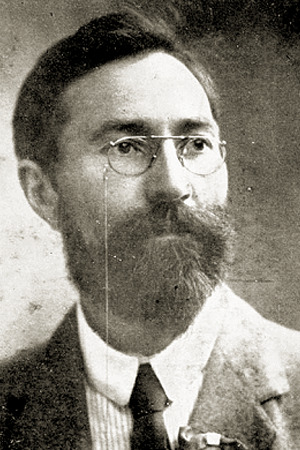
Francis Sheehy-Skeffington (died age 37)
Sheehy-Skeffington tried to organise a citizen police force to stop looting on the Tuesday of the Rising. Heading home, he was arrested in for no reason by British troops. Capt JC Bowen-Colthurst used him as a hostage while attacking the shop of Alderman James Kelly, at the top of Camden Street. Bowen-Colthurst destroyed the shop with grenades, and shot dead a 17-year-old boy before marching Sheehy-Skeffington and two journalists to Portobello Barracks. The next morning, they unaware they were going to be shot to death until moments before it occurred. They were executed the next morning on April 26th, 1916. Those involved attempted to cover up what they did.

Thomas “Tom” Clarke (died age 58)
Clarke was stationed at headquarters in the General Post Office during the Easter Week. Clarke wrote on the wall of the house after surrender on April 29th, "We had to evacuate the GPO. The boys put up a grand fight, and that fight will save the soul of Ireland." He was arrested after the surrender. He and other rebels were taken to the Rotunda where he was stripped of his clothing in front of the other prisoners. He was later held in Kilmainham Gaol. He was court-martialled and sentenced to death. Before his execution, he asked his wife Kathleen to give this message to the Irish People:
"My comrades and I believe we have struck the first successful blow for freedom, and so sure as we are going out this morning so sure will freedom come as a direct result of our action . . . In this belief, we die happy."
He was then executed by firing squad on May 3rd, 1916.
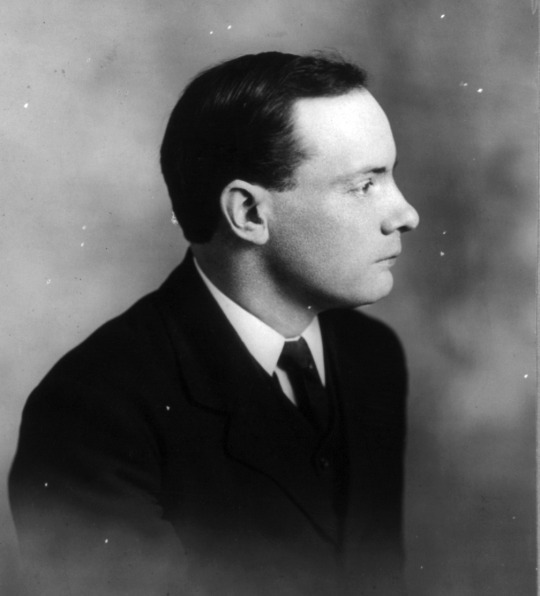
Patrick Pearse (died age 36)
Easter Monday, April 24th 1916, it was Pearse who read the Proclamation of the Irish Republic from outside the General Post Office, the headquarters of the Rising. Pearse was the person most responsible for drafting the Proclamation, and he was chosen as President of the Republic. Six days after he issued the order to surrender. He was court-martialled and executed by firing squad on may 3rd, 1916. He was said to be whistling as he came out of his cell to be killed. The day before his death he wrote:
"When I was a child of ten I went down on my bare knees by my bedside one night and promised God that I should devote my life to an effort to free my country. I have kept that promise. As a boy and as a man I have worked for Irish freedom. The time, as it seemed to me, did come, and we went into the fight. I am glad we did. We seem to have lost. We have not lost. To refuse to fight would have been to lose, to fight is to win. We have kept faith with the past and handed on a tradition to the future."

Thomas MacDonagh (died age 37)
MacDonagh's battalion was stationed at Jacob's Biscuit Factory. Despite MacDonagh's rank and the fact that he commanded one of the strongest battalions, they saw little fighting. MacDonagh received the order to surrender on April 30th, though his battalion was prepared to continue. Following the surrender, MacDonagh was court martialled, and executed by firing squad on May 3rd, 1916. In his last message to the Irish people he wrote:
"I, Thomas MacDonagh, having now heard the sentence of the Court Martial held on me today, declare that in all my acts, all the acts for which I have been arraigned. I have been actuated by one motive only, the love of my country, and the desire to make her a sovereign, independent state."

Joseph Mary Plunkett (died age 28)
Following the surrender Plunkett was held in Kilmainham Gaol, and faced court martial. Seven hours before his execution, he was married in the prison chapel to his sweetheart Grace Gifford, a Protestant convert to Catholicism, whose sister, Muriel, had years before also converted and married his best friend Thomas MacDonagh, who was also executed for his role in the Easter Rising. Grace never married again after his death on May 4th, 1816. Days before his sentence Plunkett had written in a letter to Grace:
"Listen--if I live it might be possible to get the Church to marry us by proxy- there is such a thing but it is very difficult I am told. Father Sherwin might be able to do it. You know how I love you. That is all I have time to say. I know you love me and I am very happy."

Edward “Ned” Daly (died age 25)
Daly's battalion, stationed in the Four Courts and areas to the west and north of the centre of Dublin, saw the most harsh fighting of the rising. He was forced to surrender his battalion on April 29th by Patrick Pearse. He was executed by firing squad on May 4th 1916. Men in his battalion spoke of him as a good leader.

Michael O’Hanrahan (died age 38)
O’Hanrahan was second in command of Dublin's 2nd battalion under Commandant Thomas MacDonagh. He fought at Jacob's Biscuit Factory, though the battalion saw little action other than intense sniping throughout Easter week. O'Hanrahan was executed by firing squad on May 4th 1916 at Kilmainham Jail. His brother, Henry O'Hanrahan, was sentenced to penal servitude for life for his role in the Easter Rising.

William “Willie” Pearse (died age 34)
Willie followed his brother into the Irish Volunteers and the Republican movement. He took part in the Easter Rising in 1916, always staying by his brother's side at the General Post Office. Following the surrender he was court-martialled and sentenced to be executed. It has been said that as he was only a minor player in the struggle it was his surname that condemned him. However, at his court martial he rather exaggerating his involvement. On May 3rd, William was granted permission to visit his brother in Kilmainham Gaol and to see him for the final time. While Willie was en route, Patrick was executed first and they never saw one another again. Willie was executed on May 4th, 1916.

John MacBride (died age 47)
In 1905 MacBride joined other Irish nationalists in preparing for an insurrection. Because he was so well known to the British, the leaders thought it wise to keep him outside their secret military group planning a Rising. He was in Dublin early on Easter Monday morning to meet his brother Dr. Anthony MacBride, who was arriving from Westport to be married on the Wednesday. The Major walked up Grafton St and saw Thomas MacDonagh in uniform and leading his troops. He offered his services and was appointed second-in-command at the Jacob's factory. After the Rising, MacBride, following a court martial under the Defence of the Realm Act, was shot by British troops in Kilmainham Gaol, Dublin.
He was executed on May 5th 1916, two days before his forty-eighth birthday. Facing the British firing squad, he said he did not wish to be blindfolded, saying:
"I have looked down the muzzles of too many guns in the South African war to fear death and now please carry out your sentence."
He is buried in the cemetery at Arbour Hill Prison in Dublin.
Executed two days before his 54th birthday on May 5th.
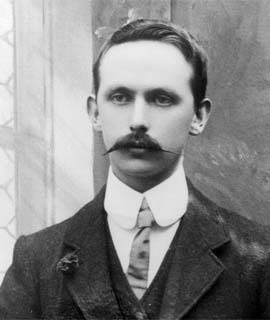
Éamonn Ceannt (died age 34)
After the unconditional surrender of the 1916 fighters, Eamonn Ceannt was detained. While Ceannt was being picked for trial, volunteer James Couhlan remembers him being determined in looking after the welfare of “the humblest of those who had served under him”. Ceannt was tried under court martial as demanded by General Maxwell. May 2nd, Ceannt was sent to Kilmainham Gaol to face trial and execution.
Written a few hours before his execution from cell 88 in Kilmainham Gaol, he wrote:
“I leave for the guidance of other Irish Revolutionaries who may tread the path which I have trod this advice, never to treat with the enemy, never to surrender at his mercy, but to fight to a finish...Ireland has shown she is a nation. This generation can claim to have raised sons as brave as any that went before. And in the years to come Ireland will honour those who risked all for her honour at Easter 1916.”
Ceannt was held in Kilmainham Gaol until his execution by firing squad on May 8th 1916. He is buried at Arbour Hill.

Michael Mallin (died age 41)
When Connolly was inducted into the Irish Republican Brotherhood in January 1916. On Easter Monday Mallin departed from Liberty Hall at 11:30am to take up his post at St Stephen's Green with his small force of ICA men and women. Upon arriving at the park they evacuated it, dug trenches, erected kitchen and first aid stations, and constructed barricades in the surrounding streets. Mallin planned to occupy the Shelbourne Hotel, located on the north-east side of the park, but insufficient troops prevented him from doing so. The next morning under intense machine gun fire Mallin ordered his troops to retreat to the Royal College of Surgeons on the west side of the park. The garrison remained in the barricaded building for the remainder of the week.
Mallin surrendered on April 30th 1916. The garrison was taken first to Dublin Castle then to Richmond Barracks, where Mallin was separated for court-martial. At his court-martial he downplayed his involvement. In his statement, Mallin stated:
“I had no commission whatever in the Citizen Army. I was never taken into the confidence of James Connolly. I was under the impression that we were going out for manoeuvres on Sunday . . . Shortly after my arrival at St Stephen's Green the firing started and Countess Markievicz ordered me to take command of the men as I had been so long associated with them. I felt I could not leave them and from that time I joined the rebellion."
Mallin was found guilty and transported to Kilmainham Gaol for his execution. He was executed May 8th 1916. The night before his execution he was visited in his cell by his mother, three of his siblings, his pregnant wife and their four children. In his last letter to his wife, who was pregnant with their fifth child, Mallin said:
"I find no fault with the soldiers or the police [I ask you] to pray for all the souls who fell in this fight, Irish and English . . . so must Irishmen pay for trying to make Ireland a free nation."
He wrote to his children:
“Una my little one be a Nun Joseph my little man be a Priest if you can James & John to you the care of your mother make yourselves good strong men for her sake and remember Ireland”
His funeral mass took place at the Dominican Church in Tallaght on May 13th, 1917. People from the procession clashed with police outside the church with two policemen injured.
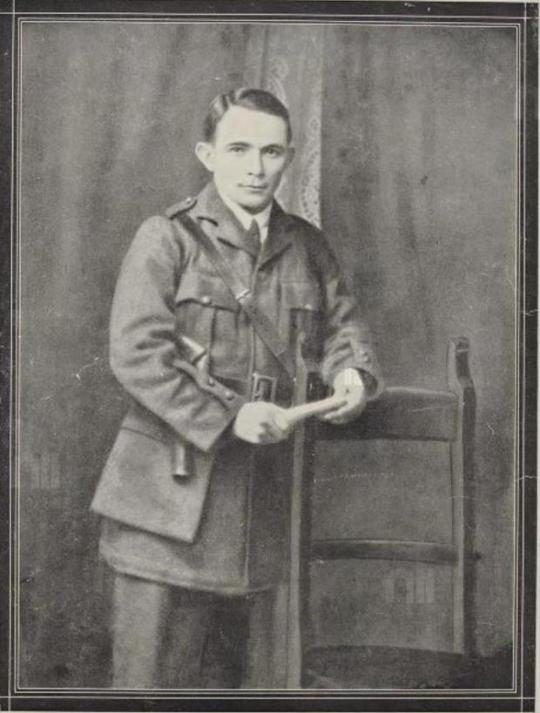
Con Colbert (died age 37)
In the weeks leading up to the Rising, he acted as bodyguard for Thomas Clarke. During Easter Week, he fought at Watkin's Brewery, Jameson's Distillery and Marrowbone Lane. They were marched to Richmond Barracks after surrender, where Colbert would later be court-martialled. Transferred to Kilmainham Gaol, he was told on Sunday May 7th he was to be shot the following morning. He wrote no fewer than ten letters during his time in prison. During this time in detention, he did not allow any visits from his family; writing to his sister, he said a visit "would grieve us both too much".
The night before his execution he sent for Mrs. Ó Murchadha who was also being held prisoner. He told her he was "proud to die for such a cause. I will be passing away at the dawning of the day." Holding his bible, he told her he was leaving it to his sister. He handed her three buttons from his volunteer uniform, telling her "They left me nothing else," before asking her when she heard the volleys of shots in the morning for Éamonn Ceannt, Michael Mallin and himself would she say a Hail Mary for the souls of the departed. The soldier who was guarding the prisoner began crying according to Mrs. Ó Murchadha, and recorded him saying "If only we could die such deaths."
Colbert was shot by firing squad the next morning on May 8th 1916.
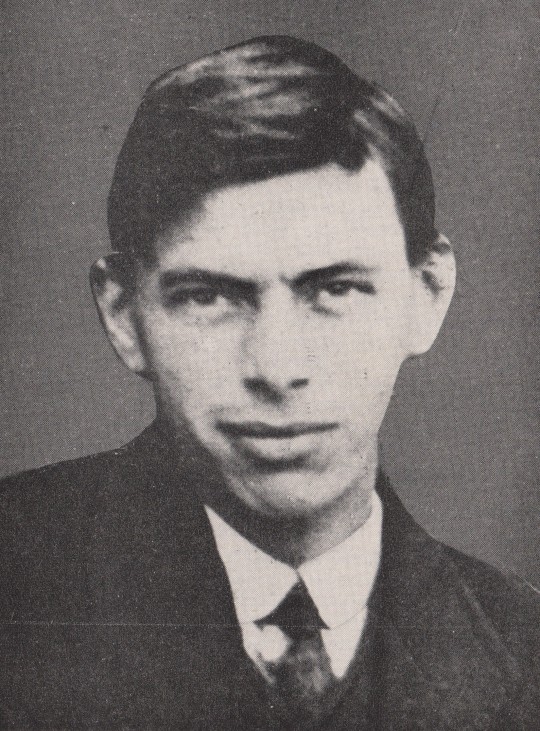
Sean Heuston (died age 25)
Heuston was the Officer Commanding of the Volunteers in the Mendicity Institution on the south side of Dublin city. Heuston was to hold this position for three or four hours, to delay the advance of British troops. This delay was necessary to give the headquarters staff time to prepare their defences. Heuston was arrested after the surrender and transferred to Richmond Barracks. O May 4th 1916, he was tried by court martial. May 7th 1916, the verdict of the court martial was communicated to him that he had been sentenced to death and was to be shot at dawn the following morning.
Prior to his execution he was attended by Father Albert in his final hours. Father Albert wrote an account of those hours up to and including the execution:
“…We were now told to be ready. I had a small cross in my hand, and though blindfolded, Seán bent his head and kissed the Crucifix; this was the last thing his lips touched in life. He then whispered to me: ‘Father, sure you won’t forget to anoint me?’ I had told him in his cell that I would anoint him when he was shot. We now proceeded towards the yard where the execution was to take place; my left arm was linked in his right, while the British soldier who had handcuffed and blindfolded him walked on his left. As we walked slowly along we repeated most of the prayers that we had been saying in the cell. On our way we passed a group of soldiers; these I afterwards learned were awaiting Commandant Mallin; who was following us. Having reached a second yard I saw there another group of military armed with rifles. Some of these were standing, and some sitting or kneeling. A soldier directed Seán and myself to a corner of the yard, a short distance from the outer wall of the prison. Here there was a box (seemingly a soap box) and Sean was told to sit down upon it. He was perfectly calm, and said with me for the last time: ‘My Jesus, mercy.’ I scarcely had moved away a few yards when a volley went off, and this noble soldier of Irish Freedom fell dead. I rushed over to anoint him; his whole face seemed transformed and lit up with a grandeur and brightness that I had never before noticed.”
Father Albert concluded:
“Never did I realise that men could fight so bravely, and die so beautifully, and so fearlessly as did the Heroes of Easter Week. On the morning of Sean Heuston's death I would have given the world to have been in his place, he died in such a noble and sacred cause, and went forth to meet his Divine Saviour with such grand Christian sentiments of trust, confidence and love.”
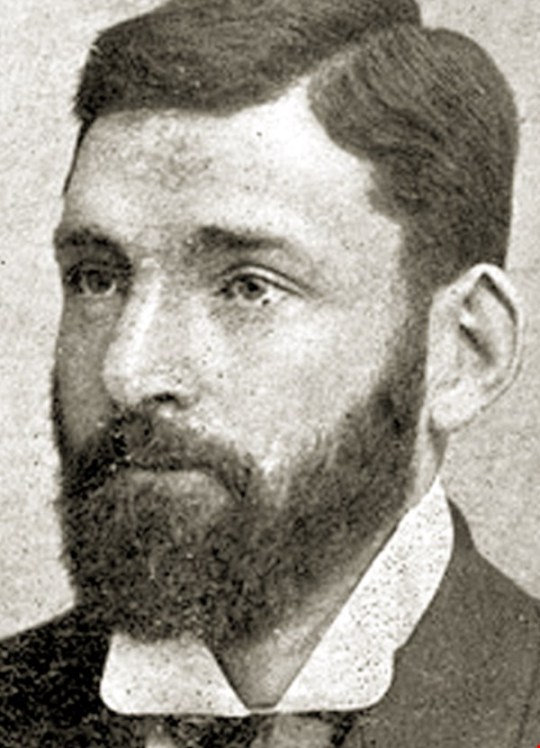
Thomas Kent (died age 50)
During the Easter Rising, the Kent residence was raided in a gunfight lasted for four hours. Eventually the Kents were forced to surrender. Thomas and William was tried by court martial on the charge of armed rebellion. His brother was acquitted, but Thomas was sentenced to death and executed by firing squad in Cork on May 9th 1916. He was buried in the grounds of Cork Prison.
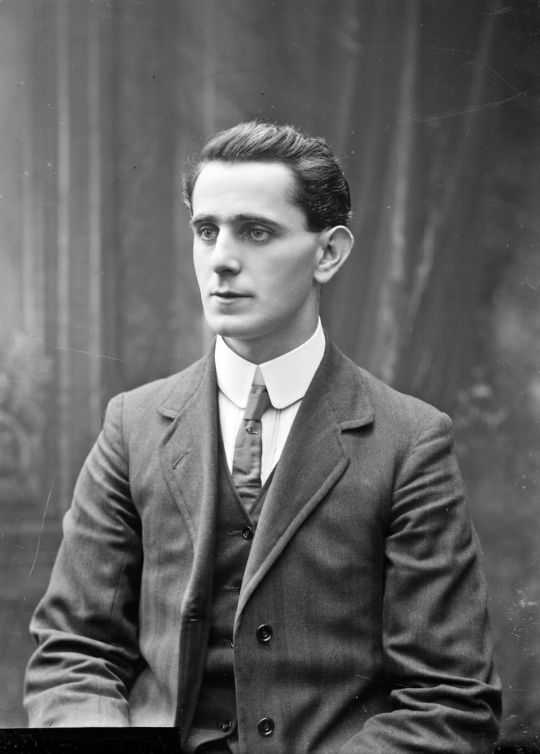
Sean Mac Diarmada (died age 33)
September 1915, he joined the secret Military Committee of the IRB. In 1914 he said:
"the Irish patriotic spirit will die forever unless a blood sacrifice is made in the next few years.”
Due to his disability, Mac Diarmada took little part in the fighting of Easter week, but was stationed at the headquarters in the General Post Office. Following the surrender, he nearly escaped execution by blending in with the large body of prisoners. He was eventually recognised by Daniel Hoey of G Division. Following a court-martial on May 9th, Mac Diarmada was executed by firing squad on May 12th. In his final letter he wrote:
"Miss Ryan, she who in all probability, had I lived, would have been my wife".
She and her sister, Phyllis also visited Kilmainham Gaol before his execution. Before his execution, Mac Diarmada wrote:
"I feel happiness the like of which I have never experienced. I die that the Irish nation might live!”
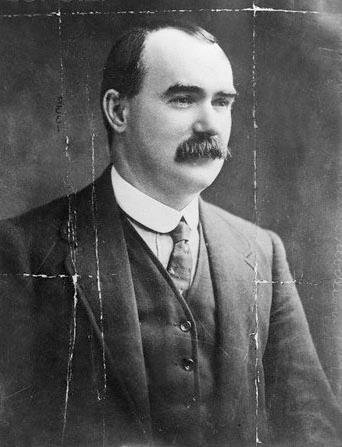
James Connolly (died age 47)
Connolly considered the rest of the leaders too bourgeois and unconcerned with Ireland's economic independence. During the Easter Rising, Connolly was Commandant of the Dublin Brigade and was de facto commander-in-chief. Following the surrender, he said to other prisoners:
"Don't worry. Those of us that signed the proclamation will be shot. But the rest of you will be set free."
Connolly was not held in gaol, but in a room at the State Apartments in Dublin Castle, which had been converted to a first-aid station for troops recovering from the war. Connolly was sentenced to death by firing squad for his part in the rising. On May 12th 1916 he was taken by military ambulance to Royal Hospital Kilmainham, across the road from Kilmainham Gaol, and from there taken to the gaol, where he was to be executed. Visited by his wife, and asking about public opinion, he commented:
"They will all forget that I am; an Irishman."
Connolly had been so badly injured from the fighting but the execution order was still given and he was unable to stand before the firing squad; he was carried to a prison courtyard on a stretcher. His absolution and last rites were administered by a Capuchin, Father Aloysius Travers. Asked to pray for the soldiers about to shoot him, he said:
"I will say a prayer for all men who do their duty according to their lights."
Instead of being marched to the same spot where the others had been executed, at the far end of the execution yard, he was tied to a chair and then shot. His body (with other leaders) was put in a mass grave without a coffin. The executions of the rebel leaders deeply angered the majority of the Irish population, most of whom had shown no support during the rebellion.
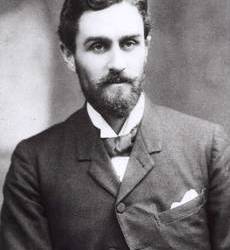
Sir Roger Casement (died age 51)
October 1914, Casement sailed for Germany via Norway. Casement spent most of his time in Germany seeking to recruit an Irish Brigade from among more than 2,000 Irish prisoners-of-war taken in the early months of the war and held in the prison camp of Limburg an der Lahn. His plan was that they would be trained to fight against Britain in the cause of Irish independence. Casement did not learn about the Easter Rising until after the plan was fully developed. The German weapons never landed in Ireland; the Royal Navy intercepted the ship transporting them.
Casement departed Germany in a submarine. In the early hours of April 21st 1916, three days before the rising began, the German submarine put Casement ashore. Suffering from a recurrence of the malaria, and too weak to travel, he was discovered at McKenna's Fort and arrested on charges of treason, sabotage and espionage against the Crown.
"He was taken to Brixton Prison to be placed under special observation for fear of an attempt of suicide. There was no staff at the Tower [of London] to guard suicidal cases."
At Casement's highly publicised trial for treason, the prosecution had trouble arguing its case. Casement's crimes had been carried out in Germany. During the trial, Casement’s personal diary detailed his homosexual encounters was uncovered. The British government circulated fake reports to portray Casement as a sexual deviant. Casement tried to appeal the violation of his human rights and against his conviction and death sentence. On the day of his execution, Casement was received into the Catholic Church at his request. He was attended by two Catholic priests. One said of Casement that he was:
"a saint… we should be praying to him [Casement] instead of for him".
Casement was hanged at Pentonville Prison in London on August 3rd 1916. His last word was “Ireland”.
#irish history#history#irish rebellion 1916#eastern rising#Francis Sheehy-Skeffington#thomas clarke#tom clarke#Patrick Pearse#Thomas MacDonagh#Joseph Mary Plunkett#Sir Roger Casement#joseph plunkett#roger casement#James Connolly#Sean Mac Diarmada#Thomas Kent#Sean Heuston#Con Colbert#Michael Mallin#Éamonn Ceannt#John MacBride#William Pearse#willie pearse#Edward daly#ned daly#Michael O’Hanrahan
515 notes
·
View notes
Text
Republicanism
The attached proposed op/ed article is hereby submitted to every print media organisation in Britian and Ireland with a view to getting it published. No fee is sought.
=====
Republicanism. A Normative Definition.
"If you ask what kind of a man he was, he answers that he lived content with his own small fortune. Bred a scholar, he made his learning subservient only to the cause of truth". (Epitaph of John Locke).
After all the recent talk of reclaiming 'republicanism' for the Irish people, I argue that we must first describe what we mean by that term before we can have any meaningful insight into what in fact we are 'reclaiming.' Traditionally, in an Irish context, 'republicanism' has been identified with opposition to 'monarchy,' but it is more. The word comes from the Latin term 'res publica' meaning 'things public' or alternatively 'public affairs.' Plato's 'Republic' is something of a misnomer in that the original title ' politeia' more closely relates to the concept of politics or citizenship. Likewise Cicero's 'De republica' is not taken to accord to any modern definition of republicanism although he did say that 'some sort of free-state' is the necessary condition of a republic.
The modern idea of the Republic (in the sense that is widely understood) is drawn from ancient Greece and Rome but it was truly created during the Renaissance when scholars developed what is known as 'classical republicanism'. Classical republicanism rejected monarchism in favour of 'rule by the people' and writers like Machiavelli proposed various versions of such a system of government. However, during the Enlightenment men like John Henry, Thomas Paine and John Locke paved the way for a new understanding of republicanism that ultimately came to fruition in Thomas Jefferson's Declaration of Independence in 1776.
Familiar from before was Jefferson's call that 'governments are instituted among men, deriving their just powers from the consent of the governed.' However, freely elected governments could still lead to the 'tyranny of the majority' where democracy was "nothing more than mob rule, where fifty-one percent of the people may take away the rights of the other forty-nine." Thus, according to Jefferson, democracy was a necessary but not sufficient factor for republicanism. Necessary too was the concept that each individual (however in the minority) had 'certain inalienable rights.' In order to prevent pure democracy endangering individual rights therefore, Jefferson advocated a republic where individual freedom was protected from democratic rule by a set of laws enacted in a Constitution.
Expanding on the concept of the 'sovereignty of the people' Jefferson wrote that the mother principle of republicanism was therefore that 'governments are republican only in proportion as they embody the will of their people, and execute it.' Citizens likewise had responsibilities. Implicit here is the idea of active citizenship which stresses the moral duty of 'republicans' to act in the interests of the republic or to be 'patriotic.' The opposite of patriotism consists of the corruption often referred to by such classical republican thinkers as Aristotle and Machiavelli, in which citizens are more concerned with their personal and group interests than with the common good of the political community as a whole.
So what has the term 'republicanism' come to mean in an Irish context then? Some years ago while on a J1 visa on Nantucket a friend remarked on the fact that every house on the island seemed to have a US flag flying proudly in the front garden. 'If we did that people would just think we were RA' he remarked. I don't think you would struggle to find somebody of my generation in Ireland today who hasn't been inhibited in expressions of pride in Irish republican values as a result of the uniquely Irish connotations of the term 'republicanism,' even if perhaps they wouldn't have put it quite that way. Consider this from Queens's historian Feargal McGarry;
'the ideological vagueness of modern Irish republicanism, a distinctive political tradition rooted more in an incoherent blend of Fenianism, Catholic nationalism and Irish-Ireland cultural nationalism than the republican principles of the American revolution.. It is only in this sense that figures as diverse as Wolfe Tone (a product of the French Enlightenment) and Patrick Pearse can be brought together in a seamless pantheon of martyrs to sustain and legitimise present day republican objectives'.
Tom Gavin has also noted that 'the term republicanism is generally understood in Ireland as a sort of shorthand for insurrectionist anti-British nationalism rather than any particular ideological or philosophical principles'. On this question there can be little doubt, although I have yet to hear a single commentator in the Irish media make this point. Yet the importance of this question is central to the whole debate. Surely we must know what we are 'reclaiming' if we are to have any chance of a legitimate choice with regard to whether we want to 'reclaim' it or not. Suppose as an experiment we took to agree on Jefferson's principle that politicians or governments are 'republican' 'only in proportion as they embody the will of their people, and execute it.' How would modern-day Irish 'republicans' score on this metric then?
Sinn Fein/IRA would surely not score well. Never since the 1920's did the 'struggle' command popular support, so their compliance with the 'will of the people' or even basic democratic principles is surely in single figures. On the personal and ' inalienable rights' of individuals they must score zero by default such has been their callow disregard for innocent life. Ironically, until the Good Friday Agreement, Sinn Fein/IRA have repeatedly been defined and shaped by their opposition to political compromise, and the most inflexible of them have always succeeded in representing themselves as the authentic voice of 'republicanism.'
How about the 'republican party' Fianna Fail? How do they score on embodying the 'will of the people?' Well, recent evidence is not encouraging. On February 15th 2003 an Irish Times/MRBI opinion poll showed that without a new UN resolution (which never came) just 21% of the Irish people would approve of allowing Shannon airport to be used by the US military, with 68% disapproving. A republican government therefore would have disallowed the use of our sovereign territory in such an illegal war in accordance with the wishes of 2.8 million of its citizens. 'The Republican Party' in government did the opposite.
However, any attempt to assess the extent to which Irish politicians 'embody and execute' the will of the Irish people however is subject to one serious restriction. Even if data on wider citizen preferences were available (which is infrequently the case), such an analysis presupposes that each citizen has all the information at hand required to form an informed opinion. If this is not the case then surely no degree of public acquiescence can confer 'republicanism' on any politician, political party or government. As Jefferson said, 'only when the people are well-informed can they be trusted with their own government.'
It may come as cold comfort to those of us who view Irish 'republicans' as having abrogated their political responsibilities to the Irish Republic to say that in the United States the situation is even worse. There, the 'Republican party' was long known for its adherence to balanced budgets, constitutional government, a non-interventionist foreign policy and for keeping government out of peoples personal lives. Today that country has unprecedented deficits, the Bill of Rights has been eviscerated, the army is bogged down in two (and potentially a third) Asian wars and well, in a word, Schiavo.
It is perhaps symptomatic of the age that nobody seems to realise that here in Ireland or in the United States we are led by 'republicans' who only seem to share one thing in common, a distain for basic republican values. This can be expressed in terms of democratic values, respect for the individual or advocacy of an informed public. Axiomatically, we don't realise because we are uninformed. We are uninformed (in both jurisdictions) primarily because we live in corporate controlled media environments where the objectives of corporations (legal citizens?) and citizens shall never the mark twain meet.
Almost one hundred years ago that Irish patriot James Connolly stated that the struggle for Irish freedom had two aspects, national and social. Were he to analyse the state of Irish freedom in 2006 he would surely have a different focus. Yet if we can agree that a republic is such 'only in proportion as it embodies the will of their people' and that the people 'can only be trusted with their own government when they are well-informed' can we not say that 'republicanism' in 2006 can be interpreted as the degree to which public opinion is informed? I believe we can and we should. Perhaps only then is our true august destiny possible.
=====
Morgan Stack is a lecturer at the Department of Accountancy, Finance and Information Systems at University College Cork. He is co-founder of the Irish 9/11 Truth Movement and an independent candidate at the next general election in the constituencies of Kerry North and Cork South Central.
0 notes
Text
Johnson's Brexit proposal is riddled with problems

By L Alan Winters
At last, a chink of clarity. Yesterday's proposal for the treatment of the Irish economy admits, more or less for the first time officially, that there are trade-offs to Brexit. Suddenly the laws of political physics are restored. You cannot both have your cake and eat it.
The trade-off that has at last dawned on Boris Johnson is that if you want the whole of the UK to choose its own tariffs on goods, a customs border in Ireland is inevitable. And if you want Britain to be able to set its own regulations, then you need a border in the Irish Sea.
On the former, the question is choosing between a customs border that might set back the Irish peace process and the right to set our own tariffs, which it is believed might generate some economic benefits. The choice is political, but weighing up the two sides of the scale is largely technical.
The broad outline of the proposal is that Northern Ireland will
align with the Republic on regulatory issues, which will require a border in the Irish Sea, and
align with the rest of the UK for customs duties and related policies, which will require a border between Northern Ireland and the Republic.
The prime minister insists that these borders can be infrastructure-free and decentralised across space, but they are borders nonetheless. They will entail costs for governments and business, both of which will, to at least some extent, reduce the real income that can be devoted to ordinary living.
Dispersing inspections and facilities will be more expensive for government than concentrating them in one or a few locations. And since full tracking is envisaged between the inspection points and the actual border these costs will be significant.
It is far from clear that a society that has lived through the Troubles will be comfortable with the deep surveillance and dispersed exercise of executive power implicit in this proposal.
A further concern is that schemes like trusted trader regimes, which render these inspections less visible, impose far larger burdens proportionally on smaller businesses than on larger ones.
Finally, a dispersed system administering the wide variety of tariffs that apply in the UK and the EU seems highly likely to be leaky.
The argument that large firms and traders will always obey the law looks hollow given the experience of Volkswagen and emissions controls. And then there are the people who don't want to obey the law.
I am not qualified to comment on the degree of damage that a border in Ireland will do to the peace process, but one cannot deny that there are real concerns.
Turning to the other side of the equation, what about trade?
Johnson has offered no argument about the actual value of the UK having an independent tariff policy. Earlier estimates suggest that the benefits of trade agreements with more distant trade partners – even large ones like the USA and Japan – will not be large. Similarly, using Britain's newfound freedom to abolish all tariffs confers only minor gains.
The regulatory border in the Irish Sea is likely to have considerable significance in the long run. The extent to which Britain will align with the EU is yet to be determined, but the current UK government appears to be contemplating serious divergence. The wider it is, the more heavy-handed the enforcement regime will become.
For example, the government is saying that it will not abide by the so-called level playing field elements of the November 2018 agreement. It is watering down the oversight of environmental regulation.
While many tariffs in the EU and the UK will be low enough or close enough to eliminate the incentive for smuggling, some differences will be very large right from the start. The UK will be obliged by WTO rules to run its own system of anti-dumping duties based on UK conditions and this will inevitably produce a different set of anti-dumping duties from those in the EU. These can easily reach 30% and more.
Even if the UK and the EU eventually negotiate a free trade agreement with zero tariffs, these will be subject to rules of origin. That entails paperwork that can mostly be done away from the border, but which is underpinned by the threat and occasional actuality of customs inspection. In other words, even if the UK and EU agree a free trade agreement with zero tariffs, there will still be formalities for the customs system to administer.
Johnson's proposal, as with Theresa May's, almost completely ignores the services industries, which is 80% of the UK economy. I have focussed here on only one of the issues – goods trade – because that is the most contentious even if it is not the most important. It is also the one that most obviously violates the joint report which Johnson agreed to as foreign secretary in December 2017.
I welcome the increased clarity that Johnson's new offer entails, even as it reveals that he has not yet formulated, still less debated, the trade-offs correctly. It is a pity that we have only ten days to do all that. If government had listened to any informed analysis rather than hide behind cake-ism, we could have had 1,000 days.
0 notes
Text
Nigeria @59: There is Cause For Worry Says TUC

BY TAIWO OGUNMOLA-OMILANI
it was a great joy for those who witnessed the ceremony when Nigeria gained her independence 59 years ago from Britain. History records that it was an electrifying experience because for once the founding fathers, nay Nigerians will now determine their own fate. It was a trying period but without bloodshed.
However, the bloodletting came almost six years after independence with the military interregnum that saw to the end of the First Republic. The military incursion into politics, corruption, ethnicity, religious crisis, etc. have worked against our national development. It is even more worrisome and unfortunate that at this time and age the crack is widening by the day.
Truth be said, all the administrations we have so far had brought something remarkable to the table of national growth, including the present administration. However, what is important is that we must interrogate the reason(s) why countries we were at par with have left us far behind. China, India, Indonesia, etc. were our contemporaries but they are now in the first league while we are dragging economic space with some countries in Africa.
The Trade Union Congress of Nigeria (TUC) said, "Before independence agriculture was the mainstay of the economy. When oil was later discovered in commercial quantity in Oloibiri in present day Bayelsa attention shifted from agriculture instead of diversifying the economy. Other sectors were left untapped. This has made Nigeria a one-legged economy. Although revenue from tax has improved significantly but unfortunately instead of widening the tax net the impoverished public are over taxed, leading to despondency and despair".
In a statement jointly signed by the TUC President, Comrade Quadri Ogunleye and Musa Lawal, general secretary added, "Nigeria is a country blessed with human and material resources but goes cap in hand begging for grants and asking for loans. The Debt Management Office (DMO) posted recently that as at 31st March, 2019, our external debt is $25, 691.63m while domestic is $55, 664.46, totaling $81, 274, 090m. We are not saying that borrowing is bad, after all, the strongest economy in the world also borrow. Our concern is the reason for the loan. We are indebted in trillions yet we are told we have not borrowed enough. The bane of the nation’s underdevelopment is selfish leadership and people who cling to power for personal aggrandizement.
Our ConConcern
Economic team
It is a good thing that the Federal Government has set up an Economic Team made up of seasoned technocrats with good pedigree. We implore them to work to diversify the economy so the teaming youths can be gainfully engaged. If there were jobs in Nigeria our youths will not migrate in droves to other countries in search for greener pasture. It is saddening that our children die in different oceans in an attempt to cross over to Europe. Only recently hundreds of young men and women were forcefully ejected from South Africa; it is same with India, Ghana, Kenya, etc. That should not be.
In the same vein, the team must take into cognizance the fact that we are now members of African Continental Free Trade Agreement (AfCFTA). Government must not toy with the key objective of the agreement; else Nigeria will become a dumping ground. The world is a global village but every country jealously protects its corner, which is why they weigh options before partaking in agreements such as this.
Constitutional Amendment
Our constitution is not fair enough to Nigerians. It is wrong for the country to have 68 items on the Exclusive List while the Concurrent has only 12. The Federal Government has so much money to play with which to many is the reason for the do-or-die and winners-take-all kind of politics we have today. Justice is the watch-word here.
National Minimum Wage
We find it disturbing that months after the National Minimum Wage Committee (NMC) set up by the Federal Government to work on the new wage had submitted their report government is still not committed to paying the new wage. We are beginning to think that signing it in the first place was because of the 2019 General elections. To talk about setting up another Committee over the same issue makes us feel we have been swindled. We have learnt our lessons.
The argument on the part of government has always been that there is no money to pay minimum wage whereas lawmakers have budgeted N5.6bn to purchase automobile that are not produced in Nigeria. Our believe is that government can actually pay if only the cost of governance will be reduced. As long as some people continue to feel that they are more Nigerian and therefore should enjoy more than others we cannot have a sane society.
Electoral Law/INEC
At a time when countries like Ghana and Rwanda have almost perfected their electoral process the credibility of our elections are still being questioned. At 59 years we still have the challenge of; planning and logistic; government’s interest, use of federal security agencies, the role of Independent National Electoral Commission (INEC); thuggery; commercialization of votes and outright rigging; technology aided exercise, multiple thump printing, etc. We cannot afford to repeat the mistakes of the past in 2023. There should be no room for failure this time around.
Insecurity/ Agitations
Insecurity and various forms of agitations have become a major threat to lives and properties. It has even discouraged potential investors, especially foreigners. The billions of naira that should be invested to create jobs and build infrastructure are yearly budgeted for arms and ammunition, yet there appear to be no end in sight. We are beginning to think that there are people feeding from our insecurity challenge. This must be investigated and culprits brought to book.In the last 10 years according to report, Boko Haram sect have killed about 27, 000 civilians and 24 aid workers. We have a dire situation in our hand.
The war on agitations is arising from what some call marginalization. There is need for inclusiveness in governance. People should be given a sense of belonging. All the regions are still deficient in terms of basic infrastructure and therefore should be attended to. No country can make any significant progress where there is absence of justice and equity. A united Nigeria can truly be stronger than European Union but a lot depends on the leadership.
Corruption/ Cost of governance
The challenge before Nigeria is not necessarily that of lack of resources like I stated earlier, but of corruption at various levels. It is demoralizing that people in public service take advantage of their positions to enrich themselves and cronies. Corruption has put the country is a shameful state before the international community.
It is our thinking that corrupt individuals or group should face the law when found guilty of misappropriation, irrespective of their party affiliation, religion or tribe. We make a mockery of ourselves before the world if we claim we are fighting corruption but close our eyes when our friends are involved. That cannot happen in China.
We strongly call for a drastic reduction in the course of governance; which has only led to ostentatious lifestyle of politicians. Some lawmakers have been there since 1999 (20 years ago) yet they are still there, even though they have nothing in terms of ideas to bring to the table on how to fix the country.
$9.6bn judgment against Nigeria
While we commend the Federal Government on the effort made so far to save the country from paying a whopping some of $9.6bn to an Irish firm, Process and Industrial development over a failed gas contract, we also advise that they be more tactful and make consultations. As an organization we see a serious conspiracy between the government of Britain and the firm against Nigeria. This is purely international relations- if they are bent on hitting us we should also look for how we can hit back badly.
The Trade Union Congress of Nigeria, TUC, sees a very bright future if we can convert the resources nature has bequeathed to wealth. Yes, we have a role to play. There is cause for worry but we can change the narrative if we have the WILL.
We wish Nigerians a happy Independence Anniversary.
Read the full article
0 notes
Photo

New Post has been published on https://travelonlinetips.com/center-parcs-arrives-in-ireland-with-sky-high-prices/
Center Parcs arrives in Ireland – with sky-high prices


Center Parcs has arrived in the heart of Ireland – with prices that are as unfamiliar as the concept of a “sub-tropical swimming complex” with water at a constant 29.5C.
Longford Forest holiday village officially opened at 10am on Monday morning just east of Ballymahon. The location is an unfamiliar one for tourism, even for most Irish people: just north of the centre of the island of Ireland.
Existing points of interest are thin of the ground: the canal that runs beside the site on its way between Dublin and Athlone, and the town of Mullingar 20 miles east, where Niall Horan of One Direction was born and Michael O’Leary of Ryanair lives.
We’ll tell you what’s true. You can form your own view.
From 15p €0.18 $0.18 USD 0.27 a day, more exclusives, analysis and extras.
Subscribe now
Ryanair had brought the first three guests to the latest Center Parcs: three British men who are not the key demographic for the new location. But as aficionados of the Center Parcs model, they were relishing the opportunity to explore a new site and see how the template translates to Ireland.
The swimming pool (with associated water slides) comprises the core of every Center Parcs, together with a “village square” of bars, restaurants and shops. (While Starbucks works in Britain, the global brand is replaced with a generic Coffee House in Ireland.)
A sports hall includes a climbing wall, bowling alley and badminton courts, which will be useful when the weather is less benign than on opening day.
The guests are accommodated mostly in self-contained lodges, though the Irish site also includes 40 apartments.
Center Parcs was created in the Netherlands more than 50 years ago, as a way for city dwellers to experience the countryside. It arrived in the UK in 1987, with the opening of Sherwood Forest in Nottinghamshire.
Center Parcs resorts revolve around a giant swimming pool (Simon Calder)
Ireland has nothing to compare with the concept. The marketing director, Colin Whaley, says that when asking focus groups in the republic what they wanted from a family short break, they described almost exactly the Center Parcs concept: “It ticked every box.” He is responsible for selling the notion to the Irish and earning a return from the €233m (£219m) project – which was delivered in time to cash in on the school holidays in Ireland. So far, the omens are promising: it has been selling out swiftly despite prices soaring to €1,249 (£1,113) for a three-night stay in a three-bedroom “Woodland Lodge” beginning on 23 August.
As parents familiar with Center Parcs will attest, on top of the basic price, most of the activities – from archery to “adventure golf”– require additional payment.
Read more
Yet Irish families appear willing to pay dearly for the opportunity to explore what is believed to be the country’s biggest-ever leisure investment.
Four out of the first five breaks are sold out – though the resort will not be completely full, since occupancy has been capped at 90 per cent of capacity while the operation beds in.
The first Irish families through the door had positive first impressions: Mike from County Cork, who had arrived with his wife and two daughters, said: “After driving in the gate it looks amazing.”
Martha from Offaly, with three young children and a husband in tow, said the prices were justified: “You get quality for money, don’t you?”
The project has been broadly welcomed by the local community in one of the least prosperous parts of Ireland. One thousand people have been working on the construction, which has already benefited the area.
Lorraine Danaher, the human resources manager, was born in the nearby village: “Since Center Parcs made the announcement it’s been a massive boost to Ballymahon, with new bars and restaurants opening.”
Support free-thinking journalism and subscribe to Independent Minds
Carl, an IT specialist who works near the Center Parcs site, said some locals questioned how widely the benefits will spread: “People are likely to stay in Center Parcs rather than exploring the area.”
But Martin Dalby, chief executive of Center Parcs, said it will entice British visitors to explore the republic more widely: “They can take a 10-day holiday in Ireland and spend three or four days here in the middle.”
Center Parcs has, over the decades, constituted the part of the travel industry impervious to economic gloom and political upheavals. The Irish location will show if it can remain impressively profitable despite Brexit.
Source link
0 notes
Text
Irish Identity Lives in Sport
The Republic of Ireland is a fairly new country, it only became a country in 1922 when it finally gained independence from Britain, but the Irish people and their culture is as old as time. The Irish identity is very much based on this fact, because there are still many people who lived through the independence movement that are alive today. From my time here, I’ve seen the Irish people as people who have fought hard to regain their ability to simply be Irish and they celebrate their culture every opportunity they can, whether it be through the domination of the GAA or the fact that the Irish/Gaelic language is posted almost everywhere you look, right alongside English.

(Poster at Croke Park)
The GAA is probably more important than the language to Irish culture today. Under British rule in the early 20th century, these games were outlawed and if you were seen playing them you could face death. This oppression turned those games into something that transcended sport. It’s immense popularity in Ireland is less about the sport but more about how playing it is a metaphor for their fight to be independent. And what i find very cool is that they are completely aware of it. They know why this sport means so much and it only fuels the fire more.
From the short time I’ve been here and from outside knowledge, I believe that to be Irish means to be free. Part of Irish identity is their fight against the British and everything that came after. Ireland is developing more and more every year, hopefully over time this will help them add more to their identity than just what has happened in the past century.
0 notes
Text
Women In History
I grew up believing that women had contributed nothing to the world until the 1960′s. So once I became a feminist I started collecting information on women in history, and here’s my collection so far, in no particular order.

Lepa Svetozara Radić (1925–1943) was a partisan executed at the age of 17 for shooting at German soldiers during WW2. As her captors tied the noose around her neck, they offered her a way out of the gallows by revealing her comrades and leaders identities. She responded that she was not a traitor to her people and they would reveal themselves when they avenged her death. She was the youngest winner of the Order of the People’s Hero of Yugoslavia, awarded in 1951
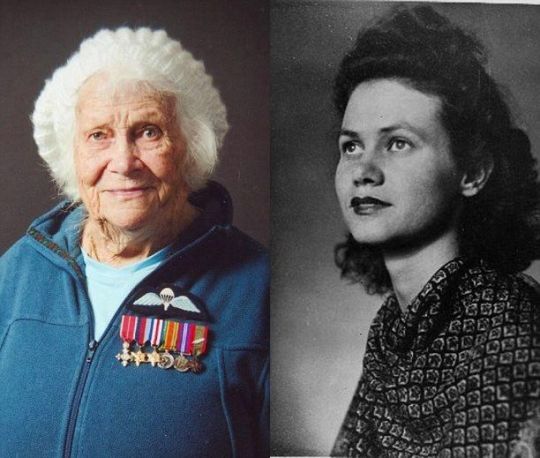
23 year old Phyllis Latour Doyle was British spy who parachuted into occupied Normandy in 1944 on a reconnaissance mission in preparation for D-day. She relayed 135 secret messages before France was finally liberated.

Catherine Leroy, War Photographer starting with the Vietnam war. She was taken a prisoner of war. When released she continued to be a war photographer until her death in 2006.
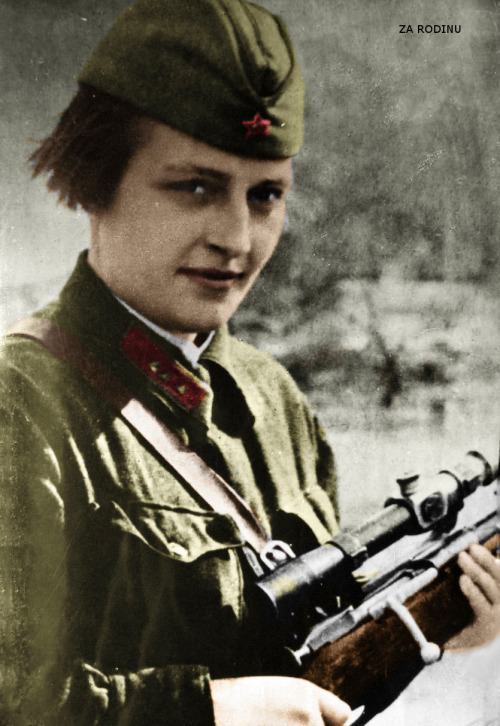
Lieutenant Pavlichenko was a Ukrainian sniper in WWII, with a total of 309 kills, including 36 enemy snipers. After being wounded, she toured the US to promote friendship between the two countries, and was called ‘fat’ by one of her interviewers, which she found rather amusing.

Johanna Hannie “Jannetje” Schaft was born in Haarlem. She studied in Amsterdam had many Jewish friends. During WWII she aided many people who were hiding from the Germans and began working in resistance movements. She helped to assassinate two nazis. She was later captured and executed. Her last words were “I shoot better than you.”.
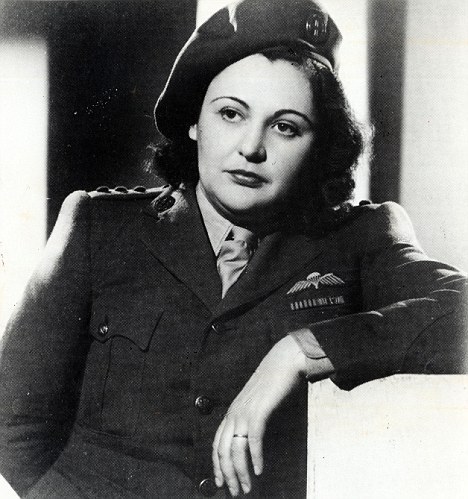
Nancy wake was a resistance spy in WWII, and was so hated by the Germans that at one point she was their most wanted person with a price of 5 million francs on her head. During one of her missions, while parachuting into occupied France, her parachute became tangled in a tree. A french agent commented that he wished that all trees would bear such beautiful fruit, to which she replied “Don’t give me any of that French shit!”, and later that evening she killed a German sentry with her bare hands.
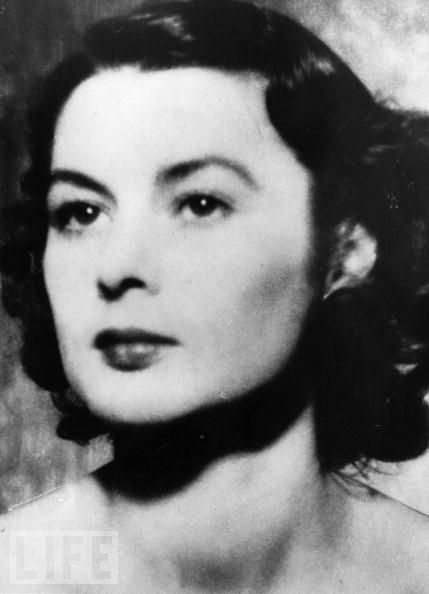
After her husband was killed in WWII, Violette Szabo began working for the resistance. In her work, she helped to sabotage a railroad and passed along secret information. She was captured and executed at a concentration camp at age 23.
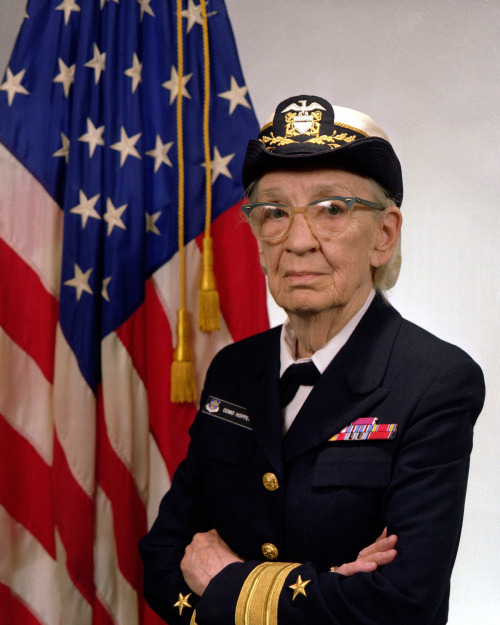
Grace Hopper was a computer scientist who invented the first ever compiler. Her invention makes every single computer program you use possible.
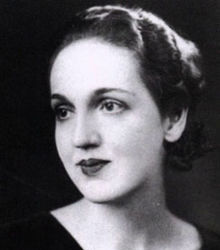
Mona Louise Parsons was a member of an informal resistance group in the Netherlands during WWII. After her resistance network was infiltrated, she was captured and was the first Canadian woman to be imprisoned by the Nazis. She was originally sentenced to death by firing squad, but the sentence was lowered to hard lard labor in a prison camp. She escaped.
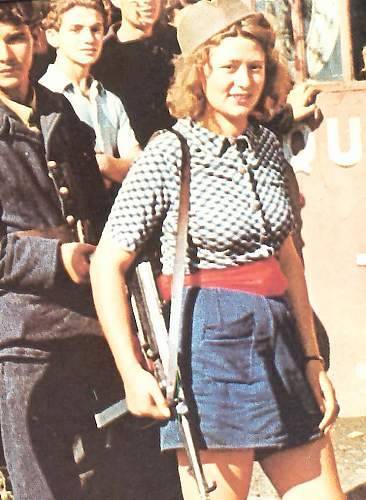
Simone Segouin was a Parisian rebel who killed an unknown number of Germans and captured 25 with the aid of her submachine gun. She was present at the liberation of Paris and was later awarded the ‘croix de guerre’.
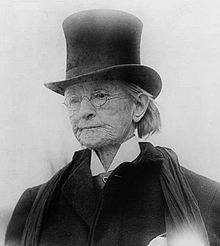
Mary Edwards Walker is the only woman to have ever won an American Medal of Honor. She earned it for her work as a surgeon during the Civil War. It was revoked in 1917, but she wore it until hear death two years later. It was restored posthumously.
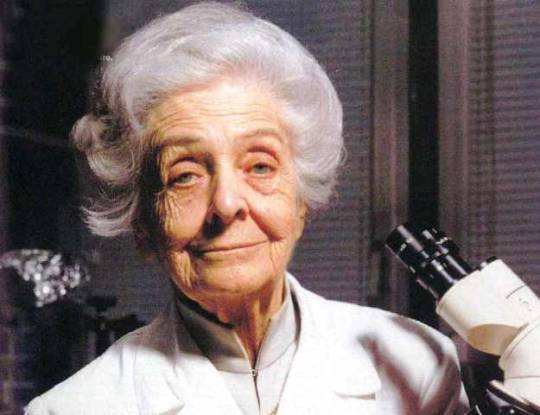
Italian neuroscientist won a Nobel Prize for her discovery of nerve growth factor. She died aged 103.
EDIT
jinxedinks added: Her name was Rita Levi-Montalcini. She was jewish, and so from 1938 until the end of the fascist regime in Italy she was forbidden from working at university. She set up a makeshift lab in her bedroom and continued with her research throughout the war.
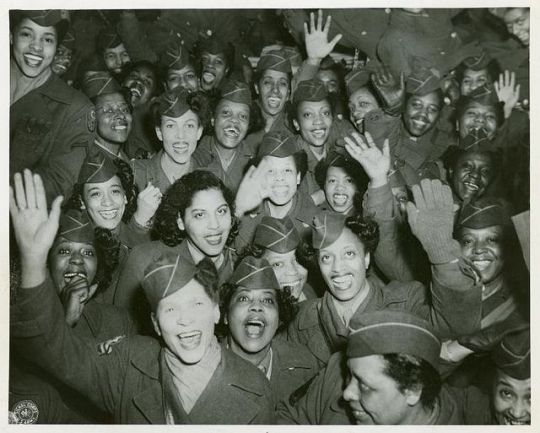
A snapshot of the women of color in the woman’s army corps on Staten Island
This is an ongoing project of mine, and I’ll update this as much as I can (It’s not all WWII stuff, I’ve got separate folders for separate achievements).
File this under: The History I Wish I’d Been Taught As A Little Girl
1 note
·
View note
Text

Maggie Thatcher and her Pedophile party
THE BRITISH PEOPLE ,SCOTTISH ,ENGLISH ,WELSH AND IRISH,(NORTH AND THE REPUBLIC),ARE DECENT PEOPLE
THEY DESERVE THE RIGHT TO LIFE ,LIBERTY AND SELF DETERMINATION
THEY DO NOT DESERVE A CENTRALISED DICTORIAL AUTHORITY CONTROLLING THEM
https://cuthulan.wordpress.com/2013/12/30/albert-einstein-a-foolish-faith-in-authority-is-the-worst-enemy-of-the-truth/
THIS CENTRALISED AUTHORITY ATTRACTS AND PROTECTS THE CORRUPT AND POWER HUNGRY
IT LETS MONSTERS RUN OUR LIVES
IT LETS MONSTERS COMMIT WAR CRIMES
IT LETS MONSTERS PREY ON OUR CHILDREN
http://current.com/community/93332432_study-politicians-share-personality-traits-with-serial-killers.htm
https://cuthulan.wordpress.com/2012/03/14/representative-governments-are-just-terrorists-drug-dealers-murders-paedophileswar-criminalsthieves-psychopaths-traitors-and-liars-with-a-couple-of-useful-idiots-thrown-in-for-window-dressi/
THESE MONSTERS HAVE BEEN IN POWER FOR A LONG TIME AND NOTHING HAS BEEN DONE TO STOP THEM
BECAUSE THEY HAVE BEEN RUNNING THE BRITISH ESTABLISHMENT FOR A LONG TIME.
THIS IS ONE REASON ,OF MANY COUNTLESS REASONS, WHY I WOULD BE VOTING FOR SCOTTISH INDEPENDENCE
WE HAVE A CHANCE TO GET OUT OF THIS HOPELESSLY CORRUPT AND FINANCIALLY BANKRUPT CENTRALISED AUTHORITY
THATCHERS REAL LEGACY
https://cuthulan.wordpress.com/2013/04/12/thatchers-real-legacy/
https://cuthulan.wordpress.com/2010/07/20/reaganomics-thatcherism-and-the-blueprint-of-financial-destruction-and-debt-slavery/
https://cuthulan.wordpress.com/2011/03/10/the-rich-get-richer-the-poor-get-the-picture/
DEBT SLAVERY AND PEDOPHILE POLITICS
Tory child abuse whistleblower: ‘I supplied underage rent boys for Margaret Thatcher’s cabinet ministers’
Whistleblower and former Conservative party activist Anthony Gilberthorpe says he provided child prostitutes for a sex and drugs party with top politicians
Senior Tory cabinet ministers were supplied with underage boys for sex parties, it is sensationally claimed.
Former Conservative activist Anthony Gilberthorpe said he told Margaret Thatcher 25 years ago about what he had witnessed and gave her names of those involved.
His allegations that he saw top Tories having sex with boys comes after David Cameron launched a Government inquiry into claims of a cover-up.
Anthony, 52, said: “I am prepared to speak to the inquiry. I believe I am a key witness.”
Trawling seedy streets during a Tory conference, Gilberthorpe says he was asked to find underage rent boys for a private sex party at a top hotel.
Today, more than three decades later, he claims he was acting on the orders of some of the most senior figures of Margaret Thatcher’s government.
Anthony says he was a full-time political activist when he helped procure the “youngest and prettiest” boys for several cabinet ministers after being told to find “entertainment”.
In a series of explosive claims about conferences at Blackpool and Brighton in the 1980s, he alleges boys as young as 15 indulged in alcohol and cocaine before they had sex with the powerful politicians.
He says one person who attended a party is a current serving minister.
Others said to be present at the parties included Keith Joseph, Rhodes Boyson, Dr Alistair Smith and Michael Havers
As a young aspiring politician, Mr Gilberthorpe admits being in awe of the men, but now insists: “They manipulated and groomed me to do their bidding.”
He said: “I was just 17 when I first went to a conference in Brighton in 1978. I couldn’t believe I was rubbing shoulders with all these important people and I couldn’t believe that they were taking such a keen interest in me. I would have done anything for them because I was so desperate to make it in politics.
“During the years I was attending conferences between 1978 and 1985, I was a full-time political activist. At the same time I was running for office in district and county council elections.”

Cabinet Minister: Former Education Secretary Keith Joseph
Cabinet Minister: Former Education Secretary Keith Joseph
Mr Gilberthorpe claims that at the 1983 Blackpool conference he was asked by Dr Alistair Smith – the Tory Party Chairman in Scotland – to arrange for young rent boys to have sex with two high-profile cabinet ministers, who we are not naming today.
Other MPs at that party were said to include Rhodes Boyson and Keith Joseph.
In that week he presented the then-Prime Minister Mrs Thatcher with a cake to mark her 58th birthday. But he says he also had a more sordid role – using his young looks to find these underage boys for her ministers.
At the time, the age of consent made it illegal to have gay sex with anyone under 21-years-old.
He said: “Dr Smith, who I looked up to at the time and was the most important Tory in Scotland, told me to go and fetch some ‘entertainment’, which was code for young boys and handed me a handful of bank notes. There was about £120.”
Mr Gilber-thorpe claims he was not shocked by the request.
He said: “It was a norm and an open secret that these older members of the Tory party, like
Dr Alistair Smith, paid for young men to join them at sex parties.
“It was the first time I was asked to fetch them but it was hardly surprising as I was becoming one of their trusted people. There was a well known and used cruising area close to the Imperial Hotel, which was a conference hotel. The hotel was not open to the public.
“I was expected to find the youngest and prettiest boys. It was what those men wanted.
“In fact it was all they wanted.
“So myself and another Tory candidate walked down there and sat on some benches underneath an archway in the Pavilion area of Blackpool and waited.”

Attorney General: Lord Michael Havers
Attorney General: Lord Michael Havers
He said they were approached within minutes by a “guy aged about 20” called James. He went on: “I asked him if he wanted to come back to the hotel and he said ‘yes’.
We asked if he had any mates and he went away and came back with two boys who were aged about 15 and no older.
“It was a surreal situation as we were dressed in suits and ties and they were wearing jeans.
“We said we would make it worth their while and the older one held out his hand and I passed him the money to share out. I promised him there would be plentiful amounts of free booze.”
Mr Gilberthorpe claims he then asked hotel security to contact a man inside who worked at the Conservative Party Central Office to arrange for the three rent boys to be given security clearance and special badges that would allow them to enter the Imperial.
He said: “All MPs, members of the National Executive and chosen delegates were given name badges that allowed you access to the conference hotel.
“Some of them had a small Oscar sign in the corner which was a code to allow others to know you were allowed into these secret parties.” He claimed the Hollywood-style Oscar symbol was actually in honour of gay writer and poet Oscar Wilde.
Once inside the Imperial, he says the group walked up several flights of stairs to a room where politicians were waiting for them, along with a table of cocaine

In attendance: Rhodes Boyson at the Conservative party conference in Blackpool, 1987
In attendance: Rhodes Boyson at the Conservative party conference in Blackpool, 1987
He said: “We took them straight upstairs and into a room where Dr Smith and other MPs were waiting for them at the party. They were given drinks and cocaine to snort and then they were all moved into the centre of the room.”
Mr Gilberthorpe said he witnessed two senior Tories having sex with the boys. He said: “A couple of other MPs were in the room. I can clearly remember seeing one politician, who is now a serving Tory MP, standing there and watching.”
Mr Gilberthorpe also claims that two years earlier in 1981 he saw Sir Michael Havers – then Attorney General – at a swimming pool party at the Tory conference in Blackpool, where underage boys were encouraged to perform sex acts on several politicians, who we are also not naming today.
He recalled: “In 1981 I was invited back to the Imperial Hotel by a Conservative councillor.
“He was a big player in the notorious right-wing group the Monday Club.
“We arrived at around midnight and I was led down some stairs to a door where two men were stood as security.
“We were allowed to enter and I was led through a tiled changing room where there were piles of clothes strewn across the floor. We then walked into an area where there was a large pool and lots of men either stood around naked or simply wrapped in towels.
“Among the MPs I recognised in there were Keith Joseph and Rhodes Boyson. I saw the Attorney General Michael Havers down there as well.
“There were a couple of glass tables set up as a mini bar with bottles of spirits on them and there was cocaine on several tables. I saw several boys who were clearly aged between 15 and 16 down there and I saw that a few were performing sex acts on MPs.
“Other young men were acting as waiters walking around with little black bow ties on. I was completely shocked by it because I was still only 20 and I had never seen anything like it.”
He added: “I stayed for a couple of hours but was tired because a conference was always a boozy affair where mainly spirits were drunk in large quantities from about 5pm onwards.”

Dr-Edward-Alistair-Smith-CBE
Request: Smith ‘asked for young boys’
Mr Gilberthorpe, now 52, says he also attended a sex party at the Grand Hotel in Brighton during the Conservatives’ 1984 conference.
On the night before the seafront hotel was hit by an IRA bomb attack, he claims he saw senior MPs engaging in sex acts with boys below the age of consent at a “corridor party” held in a row of rooms on the fourth floor.
He said: “There were two guys on the door at the end of the corridor and because we were in the group I was allowed to enter. Several doors were left open and others were closed.
“There were several men walking from one room to another and enjoying sex acts with other naked men, including boys who were clearly only about 15 or 16 years old. I saw Keith Joseph there and a politician who is now still a serving MP.
“It was held on the night before the bomb went off and afterwards one MP crudely joked that it was a good job it was, or there would have been rent boys falling through the floor.”
Mr Gilberthorpe, who decided to finally break his silence because he fears an Establishment cover-up, also claims that in the aftermath of the bombing, in which five people were killed, he was asked to look after two rent boys.
He said: “I rushed over there from my hotel after I heard the blast and saw Keith Joseph stood outside in a blanket.”
Yesterday he said: “I was a teenager when I first met these men and they manipulated me and groomed me to do their bidding.
“Because they were the most powerful men in the land, I was led to believe it was all OK. In truth they were abusers and once they had tired of me they simply discarded me. It is time this came to light before anyone else is abused.
“They didn’t think they were doing anything wrong and it was the norm then. They felt untouchable.”
http://www.mirror.co.uk/news/uk-news/tory-child-abuse-whistleblower-i-3848987
Tory child abuse whistleblower: ‘Margaret Thatcher knew all about underage sex ring among ministers’
Former activist Anthony Gilberthorpe says he sent Thatcher a 40-page dossier in 1989 accusing Cabinet members of abusing underage boys

Thatcher and Gilberthorpe
Her former Parliamentary Private Secretary Sir Peter Morrison has already been named in connection with a probe into the Bryn Estyn children’s home in Wrexham where Jimmy Savile allegedly molested boys.
Mrs Thatcher lobbied for Savile to be given a knighthood and he visited her at Chequers on at least 11 occasions.
The late MP Geoffrey Dickens also passed a list of names of prominent government figures involved in child sex abuse to Mrs Thatcher’s Home Secretary Leon Brittan. The list was “lost” by the Home Office.

Former High Court judge Baroness Butler-Sloss
Details of Mr Gilberthorpe’s evidence emerged as retired judge Baroness Butler-Sloss came under growing pressure to stand down as head of the Westminster child abuse inquiry.
She is accused of keeping allegations about a bishop out of a review of how the Church of England dealt with two paedophile priests because she “cared about the church.”
Now, she faces fresh criticism over her admission of the key role of Lord Havers in the Cleveland child sex abuse inquiry in 1987 which she led.
Asked who instigated the Cleveland inquiry in 2003 Lady Butler-Sloss replied: “I think it was my brother actually as Lord Chancellor.”
A key part of the Thatcher era was her emphasis on “family values” and personal morality.
at around the same time the former PM’s Parliamentary Private secretary, the late sir Peter Morrison, was indulging his sexual appetite for boys as young as 15.
http://www.mirror.co.uk/news/uk-news/tory-child-abuse-whistleblower-margaret-3849172
Margaret Thatcher ‘personally covered up’ child abuse allegations against senior ministers
The Tory Prime Minister is said to have held a meeting with a rising star, who was tipped for promotion, and told him: “You have to clean up your sexual act”
Margaret Thatcher personally covered up child abuse allegations made against one of her senior ministers, according to explosive new claims.
The Sunday People reports Tory Prime Minister is said to have held a high-powered meeting with the rising star, who was being tipped for promotion, and told him: “You have to clean up your sexual act.”
It followed an allegation that the minister had sexually abused young boys at the home of one of his political allies in 1982.
However the minister apparently ignored the warnings.
It is claimed that four years later he was spotted by police seeking young boys for sex at Victoria railway station in London.
But no action was taken.
The extraordinary claims – made to the Sunday People by a source with inside knowledge of Scotland Yard in the early 1980s – are now expected to be put before the
Westminster child abuse inquiry announced last week by the Prime Minister.
They go to the very heart of claims that there was an Establishment cover-up to protect politicians , judges and police officers involved in a sick paedophile network.
According to the source, the minister’s alleged interest in abusing young boys first came to light after he stayed at the home of a constituency agent.
The agent, responsible for securing local election success for the Tory MP, is believed to have alerted authorities.
A high-level meeting involving then Prime Minister Mrs Thatcher, Home Secretary Willie Whitelaw, a senior policeman and an MI5 officer was held to discuss his alleged behaviour.
The minister, according to the source, was then summoned to 10 Downing Street.
But, instead of being disciplined or sacked, the minister was warned about his future behaviour and the matter was swept under the carpet.
Four years later, fresh allegations surfaced

Request: Smith ‘asked for young boys’
In 1986, the politician was alleged to have been found seeking rent boys in the men’s toilets at Victoria railway station in central London Alec Marnoch, a highly respected police officer and Operations Commander of the Yard’s No 8 Area which covers Westminster and the West End.
Mr Marnoch, who died aged 58 in 1999 soon after his retirement, also intimated to the source that police working in Piccadilly Circus had got a report of the same politician importuning at one of London’s most notorious rent-boy haunts – the “chicken rack”.
The “chicken rack” was a set of metal railings close to Piccadilly underground station which was a vice hotspot in the 1980s.
Boys as young as 13 waited there to be picked up by men for sex – often VIPs such as politicians, TV stars or even policemen
The Sunday People has been leading the way since Mr Watson first stunned Parliament and PM David Cameron in October 2012 with claims of a high-profile paedophile network with links to 10 Downing Street.
Since breaking the story, we have produced a string of exclusives about the alleged VIP paedophile ring and reveal how far it reached.
We first revealed the existence of the “Dickens dossier” which was handed to then Home Secretary Leon Brittan.
Its disappearance has prompted the Butler-Sloss inquiry.
The dossier, compiled by now-dead MP Geoffrey Dickens , contained information that would blow the lid off a secret VIP paedophile network, according to Mr Dickens’s son Barry.
He says that in the weeks after his father submitted the dossier, the family’s home was twice “professionally” burgled.
The Home Office admits there is no trace of the dossier and that 114 “potentially relevant files” have been destroyed or lost.
The Home Office was forced to defend Baroness Butler-Sloss, 80, after it was claimed she buried allegations about a bishop from a child-abuse review in 2011.
She reportedly told a victim she did not want to include the allegations in a review of how the Church of England dealt with two paedophile priests because she “cared about the Church” and “the Press would love a bishop”.
http://www.mirror.co.uk/news/uk-news/margaret-thatcher-personally-covered-up-3848836
https://cuthulan.wordpress.com/2013/02/20/paedophiles-in-panic-timebomb-at-elm-guest-house-pop-stars-a-bishop-and-a-top-politician-appear-on-a-list-seized-by-police-investigating-child-abuse-at-the-london-hotel-in-the1980s/
TONY BLAIR COVERED FOR CHILD MOLESTORS AS WELL
https://cuthulan.wordpress.com/2010/01/07/uk-government-blackmailed-into-war-blair-covers-mps-paedophile-ring-and-the-dunblane-massacre/

Tony Blair War Criminal and pedophile protector
HAS ANYTHING BEEN DONE ABOUT THESE CHILD MOLESTORS?
NO
IN FACT A ROLLING COMMITTEE WAS SET UP TO PROTECT THESE MOLESTORS
2003
The Sunday Times is reported to have obtained an FBI list of Labour MPs who have used credit cards to pay for internet child pornography, and Blair has responded by imposing a massive news blackout, failing however to stop the arrest of one of his most important aides, Phillip Lyon.The controversy [was] certain to topple the Blair government, which has already issued a D-Notice to gag the press from revealing the names of known paedophiles within the British executive, including at least two senior ministers; and the case highlights the government’s antipathy toward the Sunday Herald and its brand of independent journalism that has, among other things, exposed the role played by the domestic security agency, MI5, in helping the IRA to carry out terrorist atrocities. Also revealed by the Sunday Herald’s Home Affairs Editor, Neil Mackay, the British intelligence services are actively engaged in preventing any further child sex revelations that could incite further hostility to an already unpopular Prime Minister and destroy the morale of troops set to invade Iraq. An intelligence officer told Mackay that “a ‘rolling’ Cabinet committee had been set up to work out how to deal with the potentially ruinous fall-out for both Tony Blair and the government if arrests occur.
THE ROLLING CABINET COMMITTEE CONTINUES
IN FACT DAVID CAMERON CONTINUES TO WORK WITH AND PROTECT CHILD MOLESTORS
https://cuthulan.wordpress.com/2014/03/05/david-cameron-is-covering-for-paedophiles-again/
https://cuthulan.wordpress.com/2012/11/10/british-establishment-paedophile-rings-and-their-global-partners/
https://cuthulan.wordpress.com/2010/01/09/a-list-of-child-sex-offenders-inside-the-british-government/
https://cuthulan.wordpress.com/2013/02/20/here-is-a-list-of-100-paedophile-councillors-or-uk-political-party-affiliated-members-they-are-among-the-people-who-help-run-our-country/
http://www.activistpost.com/2012/11/child-sex-rings-reveal-worst-of-power.html
BUT THE BRITISH ESTABLISHMENT DO HAVE THE ECUDORIAN EMBASSY SURROUNDED JUST IN CASE JULIAN ASSANGE DECIDES TO TRY AND HAVE CONSENTUAL SEX WITH ANOTHER MATURE SWEDISH WOMAN!
OR
IT COULD BE THAT JULIAN ASSANGE SETUP WIKILEAKS WHICH THREATENS TO EXPOSE THE VERY DARKEST SECRETS OF THE BRITISH ESTABLISHMENT!
Foreign Minister Ricardo Patino announced Tuesday that his government is considering suing the British government in the International Criminal Court in The Hague for denying Wikileaks founder Julian Assange safe passage to Ecuador. Assange has been forced to take refuge in the Ecuadorian embassy in London since he was granted asylum by the South American country in June last year.
http://www.support-julian-assange.com/tag/ecuadorian-embassy-london/
https://cuthulan.wordpress.com/2013/06/18/police-states-theirs-and-ours/
SCOTLAND HAS THE CHANCE TO START THE LIBERATION OF THE BRITISH PEOPLE!
VOTE YES ON SCOTTISH INDEPENDENCE
SCOTLAND CAN START AS A NEW 21ST CENTURY DIRECT DEMOCRACY
Direct democracy, classically termed pure democracy, is a form of democracy and a theory of civics in which sovereignty is lodged in the assembly of all citizens who choose to participate. Depending on the particular system, this assembly might pass executive motions, make laws, elect or dismiss officials, and conduct trials. Direct democracy stands in contrast to representative democracy, (UK,EU system)where sovereignty is exercised by a subset of the people, usually on the basis of election.
Our subset of the people , all have the same financial backers and lobby groups, and are therefore a one-party-system of elected dictatorship.
http://en.wikipedia.org/wiki/Direct_democracy
https://cuthulan.wordpress.com/2014/03/21/direct-democracy-vs-representative-democracy-or-pure-democracy-vs-elected-dictatorship-the-real-root-of-todays-global-destruction/
https://cuthulan.wordpress.com/2010/01/14/a-direct-democracy-independant-scotland/
https://cuthulan.wordpress.com/2012/03/01/the-great-government-hoax-of-public-safety/
https://cuthulan.wordpress.com/2012/05/28/global-government-an-ongoing-disaster/
https://cuthulan.wordpress.com/2011/08/18/democracy-2-0-progressive-iceland-and-dictatorship-2-0-oppressive-britain-the-difference-between-true-democracy-and-elected-dictatorship/
WE CAN ROOT OUT AND ARREST THE MOLESTORS AND THE WAR CRIMINALS
https://cuthulan.wordpress.com/2014/02/26/burger-eating-war-monkeys-and-thier-track-record/
https://cuthulan.wordpress.com/2012/02/02/the-insanity-of-war-is-the-insanity-of-government-people-we-can-stop-the-war-machine/
https://cuthulan.wordpress.com/2013/06/22/america-is-running-the-worlds-largest-terrorist-operation-experts-on-the-left-and-the-right-agree/
WE CAN END THE ODIOUS DEBT AS WELL
In international law, odious debt, also known as illegitimate debt, is a legal theory that holds that the national debt incurred by a regime for purposes that do not serve the best interests of the nation, should not be enforceable. Such debts are, thus, considered by this doctrine to be personal debts of the regime that incurred them and not debts of the state. In some respects, the concept is analogous to the invalidity of contracts signed under coercion.
http://en.wikipedia.org/wiki/Odious_debt
https://cuthulan.wordpress.com/2013/05/12/independent-scotland-could-be-debt-free-if-westminster-maintains-current-stance/
1 note
·
View note
Text
Host Country Project
“Dia Dhuit” is a formal hello in my host country of Ireland. The actual translation for Dia Dhuit is God to you. The respond is “Dia is Muire Dhuit” meaning God and Mary to you. The location of Ireland is Northwest Europe. Ireland is an island surrounded by the Atlantic Ocean, Malin Sea, and the Irish Sea. Northern Ireland is only one country that boarders Ireland by land. Some of the important cities are Kilkenny, Galway, and the capital city Dublin. The language is mostly English with few western territories that speak Gaeilge. Some other sayings, I found was Aon sceal this is used to ask a friend what’s up and translates in to any news. If nothing is up the response is Diabhal an sceal meaning devil is the news. The Irish culture had a profound influence from Christianity and Celts. The Celts were Europeans warriors that traveled to Ireland and started farming. The Celts shaped many of the stories and legends that can still be heard to this day. While looking at the Irish culture there is no doubt that Christianity plays a part in the values and morality of their lives. Most of the art I have seen has had a form of a Celtic knot or a cross. Some of the closes cultures to Ireland would be England, Scotland, and America. Settlers from Europe established both Ireland and America bringing along their values and traditions.
The history of Ireland has been written in the blood of the British and the Irish. Starting in 1782 Ireland made a trade agreement that allowed the Irish Parliament to have more power. In 1798, United Irish people rebellion with help from the French and lost resulting in Britain taking tying Ireland politically with Great Britain. In 1845 to 1847 the potato crops of Ireland were riddled with disease causing the crops to be inedible. This devastated the country as agriculture was its main resource. Back to more conflict with British, on April 24 of 1916 two armed rebellions seize key locations in Dublin. In the center of the City they read the Proclamation of the Republic. The fighting last six days and on April 30 the rebels surrender. Many of the Irish had few options on the rebellion until Britain had the leaders and participants executed. The executions turned the rebels in to martyrs creating a cause against Great Brittan. A few years later in 1919 the fight with the British started again. Lasting two years the fight stopped and Ireland was now its own country away from British rule. The treaty that ended the fighting with the British slip Ireland in to Northern Ireland containing six counties and The Republic of Ireland containing twenty-six counties. But the fighting continued, a civil war broke out between the pro and anti-treaty for the next two years. The effects of this civil war can still be seen in the two-party system they have today. In 1968, Catholic marches began to stop the oppression from the protestants that ruled in the government. The British send troops to help control the marches and on January 30th 1972 the British troops fired in to a crowd of people injuring twenty-six unarmed civilians. In 1998, the Good Friday or Belfast Agreement was signed in Northern Ireland to end the bloodshed. The government is still making amends for all the violence that has happened to allow Ireland the opportunity to become a free country
The main religion in Ireland is Roman Catholic at around eighty-five percent. In recent years, this number has fallen and people that have not religious beliefs are growing. One of the significant issues Ireland currently faces is that separation of church and state. The higher government officials use their power and beliefs to choose some of the laws. An example of this is the case where a mother died while visiting Ireland because there was a complication to the pregnancy. In accordance with Irish law it is illegal to obtain any kind of abortion. In recent years, a push for the Catholic church to stop using its influence to make laws and regulations. The social system of Ireland treats man and women on reasonably equal roles. The social classes are broken in to three groups high, middle, and working. The middle class is growing as more people have a higher income however the power of the middle class has not changed. The high-class people still hold majority of the power.
Some of the main sources of news is The Irish News, The Irish Sun and The Irish Times. For television, the major stations are BBC Ireland, Boomerang Europe, and Animal Planet. Many of the stations are like the American stations with the vast network of the cable and broadcasting networks. The most famous Irish movie I found was the 1991 “The Commitments” directed by Alan Parker. Many of the movies I found from Ireland were comedies mostly in the dark comedy sub group.
When many think of Ireland they think a potato. It is true many of Irish dishes contain potatoes. I believe that this way of thinking is because the great famine that devastated the Irish people. Most of Irish food is soups and stews. Another link between the Catholics and the Irish can be seen from this past Easter season. In the Catholic tradition between Ash Wednesday and Holy Thursday is considered the season of lent. On Fridays during lent there is a fasting period from red meat. Some bishops of the Catholic church waved the fasting of red meat in the celebration of Saint Patrick’s Day. For on Saint Patrick’s Day a staple food for celebration is bangers and mash.
This project has made me want to travel to Ireland I see the history of Europe. I have always heard of the Irish hating the British but now I understand where that anger has come from. I also learned how recent Ireland has gained its independence. I am excited to see that world and open my mind to new cultures and ideas.
3 notes
·
View notes
Text
(Hi, new wrestling followers, are you ready for a whole day of nothing but posts about Irish independence?)
I’ve talked about this in previous years and am not gonna go too far into it this year, but the Easter Rising is important to me, because it was a turning point in English-Irish relations. By which I mean, it was large-scale public rebellion and English actions in the aftermath turned the tide of public opinion against them so forcefully that it couldn’t have ended without independence negotiations.
The leaders of the Rising may or may not have known from the start that they were going to lose. They were idealists and soldiers and truly believed in a free and socialist Ireland, and if the rest of the country had risen with Dublin, it might have worked, who knows. Probably not, when the army was willing to destroy a whole block just to kill the people in one of the houses, but they stuck it out as long as they could. And when it became obvious that their loss was inevitable, they changed strategy - now, instead of winning, their aim would be to draw attention to English treatment towards rebels, and thereby gain support for the movement through their deaths.
They refused to ask for pardons, Pearse actively sabotaging his chances, because they knew that if they couldn’t be heroes, they had to be martyrs. And it worked. The way they were treated was so brutal that even people who hadn’t supported the rebellion felt sympathy for their cause, and within a few years independence talks were actively underway. I mean, then you get the treaty and the civil war and Ireland still isn’t a united independent country, but none of it would be free if not for the Easter Rising and the backlash that followed.
I said I wasn’t gonna go too far into it, so if i decide to do a post about James Connolly and how his particular vision of a socialist republic has influenced my own views, it’ll be later. Maybe on May 12th, the anniversary of his death.
0 notes
Text
United Ireland Society, Áth Cliath.
Many of you will have noticed we have change the name of our Society from its original beginnings dedicated to the memory of Sean Heuston to save any further confusion that would be counterproductive to the work of republicanism. From here on we will be going under the title of ‘United Ireland Society’. We wish to evoke a crucial part of the 1867 Fenian Proclamation in our logo that…
View On WordPress
#Áth Cliath#egalitarian Ireland to its fullest#ensuring republicanism continues to promote a united#From here on we will be going under the title of &039;United Ireland Society&039;#homelessness and addiction#https://www.facebook.com/UnitedIrelandSociety/#Many of you will have noticed we have change the name of our Society from its original beginnings dedicated to the memory of Sean Heuston#Our independent nature will also keep us free to support and stand with other groups campaigns we feel line up with our core principles#The ideals that drove early republicanism we believe in recent decades have been eroded by a form regressive authoritarianism which drives#the rights of those living under Direct Provision and a evidence based campaign opposing the regressive prohibition laws in Ireland#United Ireland Society#we believe exasperate the out of control issues of gangland violence#We believe we can continue the work the core of the Society has been performing for just over four years now in promoting the ideals of I#We have new initiatives coming with the promotion of Irish unity#We wish to evoke a crucial part of the 1867 Fenian Proclamation in our logo that declared in favour of &039;Absolute Liberty of Conscienc#We&039;d like to thank those who have always supported our initiatives and events and would ask for your continued support into the future#We’ll continue to honour our revolutionary republican/socialist dead through commemorative events and street art projects in the coming mo
0 notes